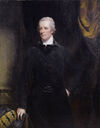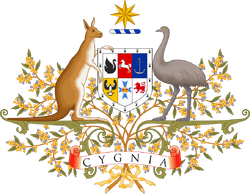| Chancellor of the Empire of the United Cygnian States | |
|---|---|
 Cancellarial Seal | |
 Flag of the Chancellor | |
| Style | The Right Honourable (official) Mr/Madam Chancellor (informal) His/Her Excellency (diplomatic) |
| Residence | The Chancellery 8 William Street Swanstone, SW 1005 |
| Appointer | The Emperor |
| Term length | At His Majesty's pleasure |
| Inaugural holder | Sir Frederick Northam |
| Formation | 6 June 1792 231 years ago |
| Deputy | Vice Chancellor |
| Salary | §400,000 annually |
| Website | chancellery.gov.cy |
The Chancellor of the Empire of the United Cygnian States is the elected head of government of Cygnia. The Chancellor leads on behalf of the Emperor both the legislative and executive branches of the Cygnian Government.
Article II of the Cygnian Imperial Constitution vests the executive power of Cygnia in the Emperor, though it is officially "at His Majesty's discretion" relegated to the Chancellor. This power includes execution of Imperial law, alongside the responsibility of appointing federal executive, diplomatic, regulatory and judicial officers, and concluding treaties with foreign powers with the advice and consent of the Senate and the Emperor. The Chancellor is further empowered to grant federal pardons and reprieves, and to convene and adjourn either or both houses of Congress under extraordinary circumstances. The Chancellor is largely responsible for dictating the legislative agenda of the party to which the Chancellor is enrolled. The Chancellor also directs Cygnian foreign and domestic policy.
The Chancellor is the leader of the party he is a member of, and is formally appointed by the Emperor to serve "at His Majesty's pleasure", though his/her term lasts as long as a congressional one – for a period of four years. In all, 33 individuals have served as Chancellor, including Franklin J. Heller, who was Chancellor during the Democratic Republic of Cygnia. One Chancellor, Charles Wallace, served two separate Chancellorships, and was the 11th and 13th Chancellors. The Government does not officially recognise Heller's Chancellorship, and thus claims the completion thus far of 54 full four-year terms by 33 individuals. On 6 February 2015, Dorian Brandt became the 33rd and current Chancellor, and is currently serving the 48th official term. The next general election is to take place in late 2018; the newly-elected Chancellor will then take office on 6 February 2019.
Origins
In 1783, Alexander I, King of the United Kingdom, fled to Cygnia following his deposition by his French subjects and the establishment of the new French Republic. He thereafter declared the six Cygnian colonies' Federation crowning himself King of Cygnia, while maintaining his existing titles as sovereign of the United Kingdom and its colonies, though the United Kingdom itself no longer existed. In creating a new Cygnian royal government, the King created a new Federation Congress, which acted as both a legislative and collective executive authority.
A French invasion of Cygnia began in 1785 in an attempt to "restore" French rule to the Cygnian colonies, precipitating the Cygnian War of Independence. King Alexander I promptly declared war on France, and declared Cygnia's independence. Former Governor of Swanstone Frederick Northam, who had become a member of the Federation Congress, was appointed to command Cygnia's armies. Ultimately, Cygnia achieved victory against the French, and in 1792 the Treaty of London was signed, ending the war and affirming Cygnia's nationhood. However, Britain itself was lost to France, and Alexander I was forced to relinquish his claim to the British throne.
The Constitutional Convention of 1792 was convened shortly after the conclusion of the war to draft the new Imperial Constitution. Following the ratification of the new Constitution by all six States in 1793, the Constitution came into effect in March. The new Constitution replaced the largely ineffectual Federation Congress' executive powers with a new, stronger executive, the Chancellorship of Cygnia.
Under the new constitution, the Chancellor became the head of Alexander I's new Imperial Government, and was to be appointed by the Emperor from the membership of the National Assembly. In reality, the Chancellor is determined through the makeup of Congress, and the leader of the largest political sect or party becomes the Chancellor.
Powers and duties
Article I legislative role
The Constitution requires the Chancellor to be a sitting member of the National Assembly. The Chancellor is therefore the de facto leader of the legislative branch as well as that of the executive. While not constitutionally specified, the Chancellor is traditionally the leader of the majority party in the National Assembly. It is also uncodified tradition that all legislation proposed by the governing party must have the approval of the Chancellor.
Article II executive powers
War and foreign affairs powers
Perhaps the most important of all Cancellarial powers is the delegated command of the Cygnian Imperial Armed Forces, though s/he is not technically its commander-in-chief — that title is vested in the Emperor. While the power to declare war is constitutionally vested in Congress, the Chancellor has ultimate responsibility for direction and disposition of the military. The present-day operational command of the Armed Forces (belonging to the Imperial Secretariat for Defence) is normally exercised through the Imperial Secretary for Defence, with assistance of the Chairman of Unified Defence Command, to the Combatant Commands, as outlined in the cancellarially approved Unified Command Plan (UCP).
Congress and the Emperor, pursuant to War Powers Act, must authorise any troop deployments longer than 60 days, although that process relies on triggering mechanisms that have never been employed, rendering it ineffectual. Additionally, Congress provides a check to Cancellarial military power through its control over military spending and regulation.
Along with the armed forces, the Chancellor also directs Cygnian foreign policy. Through the Imperial Secretariat for Foreign Affairs and International Relations and the Imperial Secretariat for Defence, the Chancellor is responsible for the protection of Cygnians abroad and of foreign nationals in Cygnia. The Chancellor decides whether to recognise new nations and new governments, and negotiates treaties with other nations. which become binding on Cygnia when approved by two-thirds vote of the Senate. These same abilities are also vested in the Emperor.
Although not constitutionally provided, Chancellors also sometimes employ "executive agreements" in foreign relations. These agreements frequently regard administrative policy choices germane to executive power; for example, the extent to which either country presents an armed presence in a given area, how each country will enforce copyright treaties, or how each country will process foreign mail. However, the 20th century witnessed a vast expansion of the use of executive agreements, and critics have challenged the extent of that use as supplanting the treaty process and removing constitutionally prescribed checks and balances over the executive in foreign relations. Supporters counter that the agreements offer a pragmatic solution when the need for swift, secret, and/or concerted action arises.
Administrative powers
Judicial powers
Legislative facilitator
Ceremonial roles
Selection process
Eligibility
Article II, Section 3, Clause 3 of the Imperial Constitution sets that the Chancellor must be:
- At least thirty years old;
- A Cygnian citizen, and by extension a resident for at least fifteen years.
A person who meets the above qualifications is still disqualified from holding the Chancellorship under any of the following conditions:
- An individual convicted in an impeachment case can be disqualified from holding federal office, including that of Chancellor, by the Senate.
The modern procedures used for electing the Chancellor were not codified in the Constitution, but rather evolved over time. Cygnia's election cycle is considered to be one of the longest in the world, and lasts for approximately one year.
Primaries
The first half of the election year is mostly dedicated to the selection of each party's leadership. While in the past each party's executive chose their congressional leaders and thus their cancellarial nominee, more recently it has been left largely to the party membership and the electorate to determine those leaders. Cancellarial nominees are guaranteed special seats in the National Assembly, which do not represent an electoral district, should their party either become the governing party or the opposition. Most minor parties hence have their leaders run for congressional seats anyway.
Throughout the first six months each State and Territory's regional branch of the major parties will hold what are known as primary votes, the victor of which will have the state party's vote in the national Conventions held later in the year. In between these primaries, the candidates campaign throughout the country in attempts to secure the votes of the various states, and engage in debates broadcast by the numerous major television stations.
Each state and territory by convention is entitled a certain number of delegates in each party's national executive body. This body commonly meets at a National Convention held in the middle of the year, generally sometime in July, when Congress is traditionally dissolved in preparation for the general election. The National Conventions of the Democratic Labour and National Unity Parties are often some of the highest-rated standalone broadcasts of the election year.
By this time, most candidates for the parties' nomination usually withdraw from the race, often declaring their support, or their "endorsement", for another candidate, encouraging their supporters to also support that candidate. At the National Convention, the party's national executive assembles to formally elect the individual who will stand as the party's congressional leader and cancellarial nominee. The delegates to the executive are traditionally bound to place their votes on behalf of the state membership they represent.
The primary process may vary from party to party.
Election
After selecting their leaders, the parties will resume campaigning (as they have during the primary process, though on a smaller scale) to secure the vote of the wider electorate. While major party leaders will often travel across the country to engage in a cancellarial campaign – many political scientists make comment on the character-based nature of the major parties' campaigns – minor party leaders, like other congressional hopefuls, normally restrict their campaigning to their home state or the electorate that they wish to represent.
Between the end of the primary process and the general election in November, it has also become common to have three or four "cancellarial debates" between the leaders of the major parties, usually those of the DLP and NUP, though there have been some instances where third parties have become strong enough to present a major challenge to the two usually dominant ones. The cancellarial debates take place at various venues across the country, and are always broadcast by the publicly owned CBA.
On 6 November, all citizens aged 18 and above place their votes for their preferred representatives in the National Assembly and the Senate; the winner of the majority of seats in the National Assembly will be permitted to form a Government. Although the Emperor appoints the Chancellor, he is in reality bound to appoint the leader of the majority party. Should none of the parties secure a majority, they may attempt to gain the support of third parties or independent politicians, allowing them to form a minority government.
The previous government continues to operate as a caretaker government until the State Opening of Congress on 23 January. The formal inauguration of the Chancellor takes place on 6 February, although s/he de facto takes office after the State Opening of Congress.
Compensation
Since 1983, the Chancellor has earned a §400,000 annual salary, along with a §50,000 annual expense account, a §100,000 nontaxable travel account, and §19,000 for entertainment. The most recent raise in salary was approved by Congress, Chancellor Martin O. Scott and Emperor Ellory I in 1981, and went into effect upon the inauguration of Joanne Seinfeld in 1983.
The Chancellery in Swanstone serves as the official residence for the Chancellor. As well as access to the staff of the Chancellery, facilities available to the Chancellor include medical care, recreation, housekeeping, and security services. The government pays for state dinners and other official functions, but the Chancellor pays for person, family and guest drycleaning and food; the high food bill often amazes new residents. Northam House in Cape Leeuwin, Augusta, is used as a country retreat and an alternative residence for the Chancellor if needed.
For ground travel, the Chancellor uses the Cancellarial state car, which is an armoured limousine built on a heavily modified Holden-based chassis. One of two identical Douglas Madison Royce MAC-30 aircraft, which are extensively modified version of DMR-18-800 airliners, have since 2015 served as long distance travel for the Chancellor and are referred to as Cygnia Two while the Chancellor is on board (although any Cygnian Imperial Air Force aircraft the Chancellor is aboard is designated as "Cygnia Two" for the duration of the flight). Domestic trips are typically handled with just one of the two planes while international flights are handled with both, one primary and one backup. Any civilian aircraft the Chancellor is aboard is designated Executive Two for the flight. The Chancellor also has access to a fleet of twenty Cygnian Imperial Marine Corps helicopters of various models, designated as Marine Two when the Chancellor is aboard any particular one in the fleet. Flights are typically handled with as many as five helicopters all flying together and frequently swapping positions as to disguise which helicopter the Chancellor is actually aboard to any would-be threats.
MIBA is charged with protecting the sitting Chancellor and his/her family. As part of their protection, Chancellors, their spouses, their children and other immediate family members, and other prominent persons and locations are assigned MIBA codenames. The use of such names was originally for security purposes and dates to a time when sensitive electronic communications were not routinely encrypted; today, the names simply serve for purposes of brevity, clarity, and tradition.
Post-Chancellery
Beginning in 1963, all living former Chancellors were granted a pension, an office, and a staff. The pension has increased numerous times with Congressional approval. Retired Chancellors now receive a pension based on the salary of the current administration's Imperial Secretaries, which was §200,000 per annum in 2016. Former Chancellors who previously served in Congress may also collect Congressional pensions. The Former Chancellors Act, as amended, also provides former Chancellors with travel funds and franking privileges. Prior to 1997, all former Chancellors, their spouses, and their children until age 16 were protected by MIBA until the Chancellor's death. In 1997, Congress passed legislation limiting MIBA protection to no more than 10 years from the date a Chancellor leaves office. On 8 February 2013, Chancellor Julia Gillard signed legislation reinstanting lifetime MIBA protection for her, Malcolm Turnbull, and all subsequent Chancellors. A spouse who remarries is no longer eligible for MIBA protection.
Some Chancellors have had significant careers after leaving office. A prominent example includes Calvin Althorpe's tenure as Chief Justice of Cygnia. Charles Wallace, whose bid for re-election failed in 1864, was elected Chancellor again four years later in 1868. Two former Chancellors served in Congress after leaving the Chancellery: Hunter Alston was elected to the National Assembly, serving there for eighteen years before retiring due to ill health. A more recent example is Joanne Seinfeld, who was elected to the Senate in 2006; she is still a Senator serving for the state of Augusta.
Chancellors may use their predecessors as emissaries to deliver private messages to other nations or as official representatives of Cygnia to state funerals and other important foreign events. Joanne Seinfeld, in between leaving the Chancellery and her election to the Senate, made multiple foreign trips to countries including China and Germany and was lauded as an elder stateswoman. Martin O. Scott has become a global human rights campaigner, international arbiter, and election monitor, as well as a recipient of the Nobel Peace Prize. Reginald Suhartono has also worked as an informal ambassador. Suhartono has also been active politically since his cancellarial term ended, and was elected to the Samudra Legislative Assembly in 2009. He currently serves as the Speaker of the Samudra Legislative Assembly.
Living former Chancellors pictured, in order of service. Below from left: Jonathan Behrens, Martin O. Scott, Dame Joanne Seinfeld, Reginald Suhartono, Malcolm Turnbull and Julia Gillard.
Oath of office
The Oath of Office of the Chancellor of Cygnia is the oath or affirmation that the Chancellor takes after assuming the Chancellorship but before he or she begins the execution of the office. The wording is specified in Article II, Section 3, Clause 6 of the Imperial Constitution. It is administered during the inauguration ceremony by the Chief Justice and in the presence of the Emperor.
| “ | I, [name], do solemnly swear/affirm that I will well and truly serve His/Her Imperial Majesty [name of monarch], His/Her heirs and successors according to law, in the office of Chancellor of the Empire of the United Cygnian States. I will to the best of my ability serve, protect and defend the Constitution of the Empire, and I will do right to all manner of people after the laws and usages of the Empire, without fear or favour, affection or ill will. (So help me God!) | ” |
List of Chancellors
| Nonpartisan Federalist Liberal-Democratic United Cygnia Democratic Labour National Unity NCSP | ||||||||
|---|---|---|---|---|---|---|---|---|
| # | Portrait | Name (Born–Died) |
Term of Office | Political Party | Emperor | |||
| Term (Election) |
Took Office | Left Office | ||||||
| 1 | 
|
Frederick Northam (1739–1806) |
1 (1792) |
13 November 1792 | 6 February 1805 | Federalist | Alexander I | |
| 2 (1796) | ||||||||
| 3 (1800) | ||||||||
| 2 | 
|
Harold Symons (1765–1833) |
4 (1804) |
6 February 1805 | 6 February 1813 | Federalist | ||
| 5 (1808) |
Theodore I | |||||||
| 3 | 
|
John Keating (1743–1820) |
6 (1812) |
6 February 1813 | 6 February 1821 | United Cygnia | ||
| 7 (1816) | ||||||||
| 4 | 
|
Carl Oregon (1752–1839) |
8 (1820) |
6 February 1821 | 6 February 1825 | Federalist | Alexander II | |
| 5 | Isaac Isaacs (1772–1845) |
9 (1824) |
6 February 1825 | 6 February 1833 | United Cygnia | |||
| 10 (1828) | ||||||||
| 6 | 
|
Jeremy Blaimey (1753–1844) |
11 (1832) |
6 February 1833 | 6 February 1837 | United Cygnia | ||
| 7 | Calvin Althorpe (1784–1856) |
12 (1836) |
6 February 1837 | 6 February 1845 | United Cygnia | |||
| 13 (1840) |
Theodore II | |||||||
| 8 | 
|
James Kilburn (1795–1856) |
14 (1844) |
6 February 1845 | 6 February 1853 | Federalist | ||
| 15 (1848) | ||||||||
| 9 | 
|
Harrison Redford (1816–1854) |
16 (1852) |
6 February 1853 | 8 August 1854 Died in office |
Liberal-Democratic | ||
| 10 | 
|
Hunter Alston (1817–1886) |
– | 8 August 1854 | 6 February 1861 | Liberal-Democratic | ||
| 17 (1856) | ||||||||
| 11 | 
|
Charles Wallace (1792–1873) |
18 (1860) |
6 February 1861 | 6 February 1865 | United Cygnia | ||
| 12 | Richard R. Renault (1829–1899) |
19 (1864) |
6 February 1865 | 6 February 1869 | Democratic Labour | |||
| 13 | 
|
Charles Wallace (1792–1873) |
20 (1868) |
6 February 1869 | 6 February 1873 | National Unity | ||
| 14 | Humphrey Langley (1823–1901) |
21 (1872) |
6 February 1873 | 6 February 1877 | National Unity | |||
| 15 | Henry G. Tyler (1845–1923) |
22 (1876) |
6 February 1877 | 6 February 1885 | Democratic Labour | |||
| 23 (1880) | ||||||||
| 16 | Alistair MacTaggart (1845–1918) |
24 (1884) |
6 February 1885 | 6 February 1889 | National Unity | Theodore III | ||
| 17 | Tobias Clausewitz (1850–1905) |
25 (1888) |
6 February 1889 | 6 February 1893 | Democratic Labour | |||
| 18 | Joshua Darius (1848–1915) |
26 (1892) |
6 February 1893 | 6 February 1897 | National Unity | |||
| 19 | Robert Fynch (1856–1949) |
27 (1896) |
6 February 1897 | 6 February 1901 | Democratic Labour | |||
| 20 | Anthony Tabot (1846–1919) |
28 (1900) |
6 February 1901 | 6 February 1905 | National Unity | |||
| 21 | Felix Colgan (1854–1948) |
29 (1904) |
6 February 1905 | 6 February 1913 | Democratic Labour | |||
| 30 (1908) | ||||||||
| 22 | Christian Heinemann (1854–1932) |
31 (1912) |
6 February 1913 | 6 February 1917 | Democratic Labour | |||
| 23 | 
|
Benjamin Patterson (1855–1923) |
32 (1916) |
6 February 1917 | 9 October 1923 Died in office |
National Unity | ||
| 33 (1920) | ||||||||
| 24 | 
|
Wesley Orwell (1879–1933) |
– | 9 October 1923 | 2 June 1933 | National Unity | ||
| 34 (1924) | ||||||||
| 35 (1928) |
Theodore IV | |||||||
| 36 (1932) | ||||||||
| – | 
|
Franklin J. Heller (1881–1946) |
– | 2 June 1933 | 8 April 1943 | NCSP | None Republic | |
| 37 (1934) | ||||||||
| 38 (1938) | ||||||||
| 39 (1942) | ||||||||
| 25 | 
|
Derrick Mayweather (1899–1994) |
40 (1946) |
5 May 1946 | 6 February 1959 | Nonpartisan | Ellory I | |
| 41 (1950) | ||||||||
| 42 (1954) | ||||||||
| 26 | Otto Humphrey (1882–1976) |
43 (1958) |
6 February 1959 | 6 February 1967 | Democratic Labour | |||
| 44 (1962) | ||||||||
| 27 | Jonathan Behrens (born 1932) |
45 (1966) |
6 February 1967 | 6 February 1971 | National Unity | |||
| 28 | Martin O. Scott (born 1930) |
46 (1970) |
6 February 1971 | 6 February 1983 | Democratic Labour | |||
| 47 (1974) | ||||||||
| 48 (1978) | ||||||||
| 29 | 
|
Joanne Seinfeld (born 1946) |
49 (1982) |
6 February 1983 | 6 February 1999 | National Unity | ||
| 50 (1986) | ||||||||
| 51 (1990) | ||||||||
| 52 (1994) |
Ellory I
| |||||||
| 30 | 
|
Reginald Suhartono (born 1956) |
53 (1998) |
6 February 1999 | 6 February 2007 | Democratic Labour | Theodore V | |
| 54 (2002) | ||||||||
| 31 | 
|
Malcolm Turnbull (born 1954) |
55 (2006) |
6 February 2007 | 6 February 2011 | National Unity | ||
| 32 | 
|
Julia Gillard (born 1961) |
56 (2010) |
6 February 2011 | 6 February 2015 | Democratic Labour | ||
| 33 | 
|
Dorian Brandt (born 1976) |
57 (2014) |
6 February 2015 | Incumbent | Democratic Labour | Theodore V
| |
| |||||||||||||||||||||||
| ||||||||||||||






